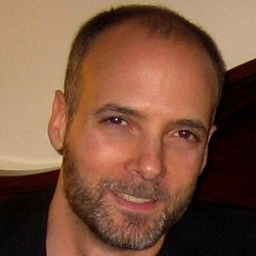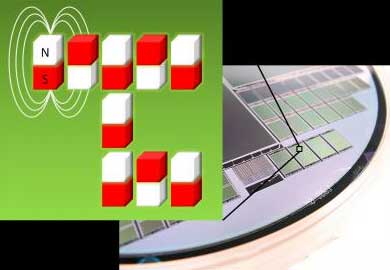Power Consumption Solved: Magnetic Processors
All right, let's be optimistic here: it's not going to entirely wipe power-hungry processors and memory off the charts anytime soon.
But there is at least an idea how to reduce the power consumption of semiconductor devices by a factor of 1 million.
The basic idea is to simply eliminate the flow of electrons, the ultimate source of power consumption. Researchers at the University of California at Berkeley said that magnetic processors could work without the need of electrons and function near the minimum power limit allowed by the second law of thermodynamics (Landauer limit). The project group estimates that a magnetic chip may only consume 18 millielectron volts of energy per operation at room temperature, which is about 1 million times below today's processors.
Instead of a traditional circuit, such magnetic processors could use nanometer-sized bar magnets for memory, logic and switching operations. "Today, computers run on electricity; by moving electrons around a circuit, you can process information," said Brian Lambson, a UC Berkeley graduate student in the Department of Electrical Engineering and Computer Sciences. "A magnetic computer, on the other hand, doesn't involve any moving electrons. You store and process information using magnets, and if you make these magnets really small, you can basically pack them very close together so that they interact with one another. This is how we are able to do computations, have memory and conduct all the functions of a computer."
While the goal is to create a computer that works at the Landauer limit, magnetic chips have substantial challenges - including the fact that they are not exactly small. The nanomagnets the Berkeley team is currently using to build magnetic memory are about 100 nanometers wide and about 200 nanometers long. They enable simple logic operations, but they are more than 10 times the size of traditional chip structures that are in development now. Lambson also noted that the magnets can be used as memory, but "the real challenge is getting the wires and transistors working." The magnets are also vulnerable to random "fluctuations from thermal effects, stray electromagnetic fields and other kinds of noise."
Needless to say, this technology is far from being mature. But hey, we can dream, right?
Get Tom's Hardware's best news and in-depth reviews, straight to your inbox.

Douglas Perry was a freelance writer for Tom's Hardware covering semiconductors, storage technology, quantum computing, and processor power delivery. He has authored several books and is currently an editor for The Oregonian/OregonLive.
-
fstrthnu Well with their current size and more functions with the processors and memory, they'd make pretty mean server chips.Reply -
alhanelem is it me or are we slowly phasing out the current technologies?Reply
magnetic processors replacing today's processors, graphene replacing silicone, phase change memory replacing flash....
is it really that good to replace everything? im having trouble keeping up with all this -
dogman_1234 alhanelemis it me or are we slowly phasing out the current technologies?magnetic processors replacing today's processors, graphene replacing silicone, phase change memory replacing flash....is it really that good to replace everything? im having trouble keeping up with all thisReply
What I see is simple concepts like IC's being flung around in one million different tech ideas. Basically, everyone will have their own way of doing one simple thing. This will be too economically straining on the world. -
apache_lives CuecuemoreJust keep that electromagnet well clear of your HDD(s) O.oReply
you do know your hdd has the biggest most powerful magnet inside it compared to every other component in the system hell more powerful then most speaker magnets for short range? -
ojas Yup it's good to dream, and it's great to keep working towards them and making them a reality. It's also good not to bee too skeptical about new tech. They may sound impractical now, but hey, 200 years ago if you told anyone about a transistor the size of a large bacterium, you'd be put in a mad-house.Reply
Actually even 70 years ago it wasn't really thought possible.
Ultra low power processors may be the future to a sustainable economy...imagine comps running off solar panels, and powering Crysis 8 maxed out in full 4D? :D -
"All right, let's be optimistic here: it's not going to entirely wipe power-hungry processors and memory off the charts anytime soon."Reply
Um, is it just me or does this first (bolded) sentence make absolutely no sense? I think you meant realistic and not optimistic?
Power-hungry carries a hugely negative connotation and also the article implies that you are "dream"ing about this newer technology, so I cannot think of any other explanation.
Needless to say, whether I have somehow misinterpreted your meaning or not, it clearly looks like a mistake right now. -
clonazepam I always think about who's gonna be the one to throw away every convention we have, and start from the ground up. Like setting up an R&D dept that pretends to not know sockets, slots, cpu's, gpu's, atx, m-atx, x86, x64, ARM exists at all. Start out with specific goals for size, computational power, and power consumption. Pretty hard i bet but i can dream. :)Reply
